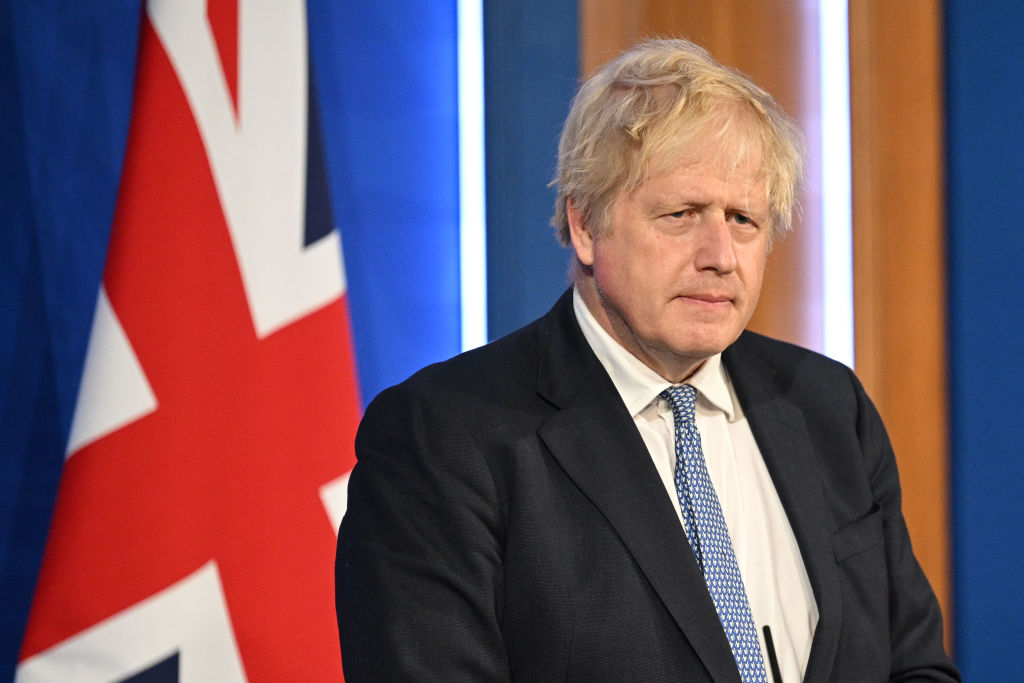British Prime Minister Boris Johnson faces imminent no-confidence vote after Tory backbench revolt


A free daily email with the biggest news stories of the day – and the best features from TheWeek.com
You are now subscribed
Your newsletter sign-up was successful
British Prime Minister Boris Johnson will face a vote of confidence in Parliament on Monday night, London time, after a backbench revolt by members of his own Conservative Party, Sir Graham Brady announced Monday morning. Brady, chairman of the 1922 Committee that oversees Conservative leadership challenges, said 54 of the 360 Tory MPs had informed him by letter that they support a vote, surpassing the 15 percent threshold.
Brady said he had informed No. 10 Downing Street of the confidence vote on Sunday and Johnson's team agreed to hold the vote as soon as possible. Many senior Conservative lawmakers, including the majority of Johnson's Cabinet, announced they will back the prime minister in Monday night's secret ballot. Johnson "welcomes the opportunity to make his case to MPs," his office said, and the vote will be "a chance to end months of speculation and allow the government to draw a line and move on" after the months-long "Partygate" scandal.
If at least 180 Tory MPs vote against Johnson, he will be forced to step down and the Conservatives will begin choosing a new leader, with Johnson ineligible to stand for re-election. If Johnson wins the vote — as his predecessor, Theresa May, did in 2019 — he is immune from another confidence vote for another 12 months.
The Week
Escape your echo chamber. Get the facts behind the news, plus analysis from multiple perspectives.

Sign up for The Week's Free Newsletters
From our morning news briefing to a weekly Good News Newsletter, get the best of The Week delivered directly to your inbox.
From our morning news briefing to a weekly Good News Newsletter, get the best of The Week delivered directly to your inbox.
Still, prime ministers can "win" confidence votes and lose their job, the BBC's Nick Robinson notes, pointing out that May stepped down within six months of her winning vote and Margaret Thatcher did the same eight days after surviving a confidence vote. Johnson, he added, "will probably cling on and wait for something to turn up."
"Make no mistake: confidence votes are almost always bad news for political leaders," BBC News politics editor Chris Mason writes. Plenty of Conservative MPs — "including the rebels — expect Boris Johnson to win tonight. But an arithmetical win is not the same as a political one," and "what we will get tonight is an indisputable number: the number of Tory MPs who want the prime minister out. It's a number that will hang around Boris Johnson's neck for the rest of his time in office."
A free daily email with the biggest news stories of the day – and the best features from TheWeek.com
Peter has worked as a news and culture writer and editor at The Week since the site's launch in 2008. He covers politics, world affairs, religion and cultural currents. His journalism career began as a copy editor at a financial newswire and has included editorial positions at The New York Times Magazine, Facts on File, and Oregon State University.
-
 Switzerland could vote to cap its population
Switzerland could vote to cap its populationUnder the Radar Swiss People’s Party proposes referendum on radical anti-immigration measure to limit residents to 10 million
-
 Political cartoons for February 15
Political cartoons for February 15Cartoons Sunday's political cartoons include political ventriloquism, Europe in the middle, and more
-
 The broken water companies failing England and Wales
The broken water companies failing England and WalesExplainer With rising bills, deteriorating river health and a lack of investment, regulators face an uphill battle to stabilise the industry
-
 Judge blocks Hegseth from punishing Kelly over video
Judge blocks Hegseth from punishing Kelly over videoSpeed Read Defense Secretary Pete Hegseth pushed for the senator to be demoted over a video in which he reminds military officials they should refuse illegal orders
-
 Trump’s EPA kills legal basis for federal climate policy
Trump’s EPA kills legal basis for federal climate policySpeed Read The government’s authority to regulate several planet-warming pollutants has been repealed
-
 House votes to end Trump’s Canada tariffs
House votes to end Trump’s Canada tariffsSpeed Read Six Republicans joined with Democrats to repeal the president’s tariffs
-
 Bondi, Democrats clash over Epstein in hearing
Bondi, Democrats clash over Epstein in hearingSpeed Read Attorney General Pam Bondi ignored survivors of convicted sex offender Jeffrey Epstein and demanded that Democrats apologize to Trump
-
 El Paso airspace closure tied to FAA-Pentagon standoff
El Paso airspace closure tied to FAA-Pentagon standoffSpeed Read The closure in the Texas border city stemmed from disagreements between the Federal Aviation Administration and Pentagon officials over drone-related tests
-
 Judge blocks Trump suit for Michigan voter rolls
Judge blocks Trump suit for Michigan voter rollsSpeed Read A Trump-appointed federal judge rejected the administration’s demand for voters’ personal data
-
 US to send 200 troops to Nigeria to train army
US to send 200 troops to Nigeria to train armySpeed Read Trump has accused the West African government of failing to protect Christians from terrorist attacks
-
 Grand jury rejects charging 6 Democrats for ‘orders’ video
Grand jury rejects charging 6 Democrats for ‘orders’ videoSpeed Read The jury refused to indict Democratic lawmakers for a video in which they urged military members to resist illegal orders
